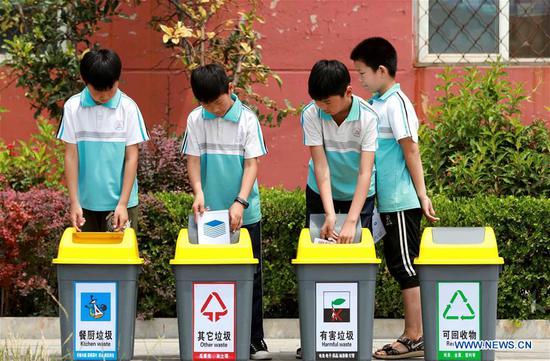
The Zhangmen platform, a provider of online tutorials, assesses a student's level of engagement by analyzing his facial expression. (Photo provided to China Daily)
Empowering teachers
Online courses have increased public access to quality educational resources, but unlike traditional classrooms, the teachers cannot directly monitor and interact with their students when teaching online, which can lead to disengaged students and poor feedback.
To resolve these issues, three students from Tsinghua and the University of Tsukuba in Japan have created an AI-based model that can be integrated into online teaching platforms to analyze facial expressions and "bullet screens", real-time viewers' comments on the screen.
The model then crunches the data and creates a line graph that tells the teacher exactly when and what parts of the lesson students find most interesting or difficult. The project won third prize at the 2018 International Collegiate Competition for Brain-Inspired Computing hosted by Tsinghua.
"This empowers teachers to gain objective, timely and multifaceted insights into their students' state of learning, which can be used to assess and improve their lessons," said Qie Nan, an industrial engineering doctoral candidate at Tsinghua and one of the people behind the project.
"Teachers are already under a lot of stress, and it is impossible for them to keep track of every student's behavior throughout a class," she said, adding that AI is meticulous, tireless and fair. "It might not replace human teachers, but it can free them from tedious tasks."
For years, burnout has been a serious issue for the teaching profession around the globe. According to a 2014 report by the Alliance for Excellent Education, a teachers' advocacy group, roughly 500,000 teachers in the United States either move to new jobs or leave the profession every year.
Speaking at the 2019 National Education Work Conference in Beijing, Chen Baosheng, minister of education, said his ministry has made reducing unnecessary work for teachers one of this year's top priorities.
"We have to free teachers from pointless paperwork and nonteaching-related work," he said.
"We have to give time and energy back to teachers to let them work on their research and on preparing lessons."
Companies and schools are already testing AI technologies to help grade papers and scan for errors, make suggestions, or notice when the students veer too far off topic.
Similar projects are also in the works in the US, such as Gradescope, an online grading application developed at the University of California, Berkeley, that claims to be able to grade exams, homework and code assignments in half the usual time.


















































